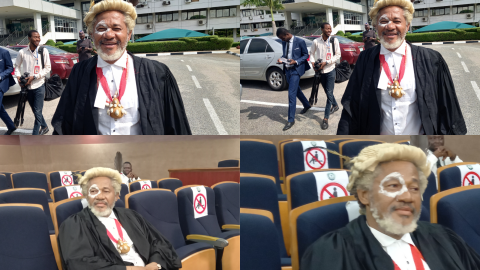
Malcom attended the proceedings dressed in an attire believed to be worn by adherents of ‘Olokun’, the ruler of all bodies of water and other water deities.
A Lagos-based human rights lawyer, Malcom Omoirhobo on Thursday caused a stir at the Supreme Court in Abuja as he was dressed like a Juju priest.
Malcom attended the proceedings dressed in an attire believed to be worn by adherents of ‘Olokun’, the ruler of all bodies of water and other water deities.

The lawyer, who hails from Delta State, said he dressed to court in that manner to exercise his fundamental human rights following the judgement of the Supreme Court that allows every Nigerian to express their way of worship and the use of hijab in schools and public places.
Upon the lawyer’s arrival in the court at about 9:00 am, the lawyers already seated were taken by surprise to see one of their colleagues in a unique attire.
The human rights lawyer walked to the court barefoot, with feathers attached to his wig.
He also had a gourd laced with cowries dangling from his neck and a red wrapper tied around his waist.
He dared the police officers and security guards who challenged him to go out of the court, saying that he has the right to come to the court in his regalia without any harassment in line with the judgement that also allows the use of hijab in schools and public places.
Meanwhile, the court proceedings were abruptly stopped when the Presiding Justice suddenly announced that he would be going for a short break.
The Judge did not give a reason for going on a "short break" or make reference to the appearance of the lawyer.
The situation, however, attracted a large crowd who thronged the courtroom to catch a glimpse of the lawyer.
Malcom told journalists, "I am very grateful to the Supreme Court, just last week Friday, they made a very resounding decision that promotes Section 38 of the constitution. That is our right to freedom of thought, conscience and religion. That we are free to express our way of worship in our schools and in our courts. That decision was reached on Friday and that has encouraged me.
"Because I am a traditionalist and this is the way I worship. Based on the decision of the Supreme Court, this is how I will be dressing henceforth to court because I am a strong adherent of ‘Olokun’ the god of rivers.”
Malcom said the implication of the judgement is that every Nigerian including doctors, police and military officers, students and journalists can now dress in line with their mode of worship in public places.
He said he was not against the judgement, rather he was happy with the decision because it strengthens and enriches the rights of all Nigerians as stipulated in the 1999 Constitution of the Federal Republic of Nigeria as amended.
The Supreme Court last Friday gave approval to female Muslim students to wear hijab to school in Lagos State.
Five out of the seven members of the court’s panel which sat on the case ruled in favour of hijab while the two remaining members dissented.
The majority decision affirmed the earlier Court of Appeal’s decision which restored the use of hijab by female Muslim students in the state.
The case involved the Lagos State Government as the appellant and Asiyat AbdulKareem (through her father), Moriam Oyeniyi, and the Muslim Students’ Society of Nigeria as the respondents.